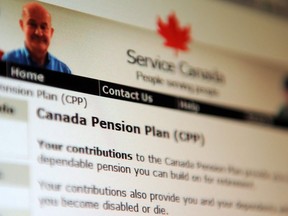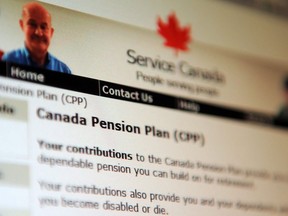FP Answers: You will have to pay more income tax and may lose some of OAS, but you’ll have more money in your pocket

Article content
Q. I turned 65 in June 2024. I still work full-time and my yearly income is about $96,000. I also collect a survivor benefit of $389 a month. I have worked for 20 years full-time and would like to delay collecting Canada Pension Plan (CPP) and Old Age Security (OAS) until age 70. Also, can I still work past age 70 while collecting CPP and OAS, and what would be the pros and cons of doing so? I have only about $250,000 in total savings with $150,000 of that in a registered retirement savings plan (RRSP.) I also have an outstanding mortgage of $100,000 on my condo. I have no company pension and will have to rely on my investment returns and employment earnings for a few years to add to savings. —Thanks, Sarah
Advertisement 2
Article content
Article content
Article content
FP Answers: Sarah, you have hit the magic age of 65 when you have CPP and OAS options. It is also an age when people spend more time contemplating their mortality and what they want to do. I don’t know what you want or what it will cost but I can see you are looking at some of the financial resources you have and trying to figure out how to make things work. I will touch on the CPP and OAS, and then give some thoughts on how to find some money and get what you want.
The common questions around CPP at age 65 are: Should I start it now and invest it or pay down my mortgage? If I start it now, should I or shouldn’t I continue contributing to CPP? Is it better delaying CPP for the larger pension? Similar questions come with the OAS. Start now and invest or delay it? And how does the clawback work?
Article content
Advertisement 3
Article content
Sarah, based on what you have written, I think the CPP and OAS decision is fairly simple: delay both to age 70 or until you stop working, whichever comes first. Delaying CPP and OAS and continuing to contribute to your CPP, which you haven’t maximized, will give you a larger guaranteed indexed pension for life. Plus, you don’t need the extra income while you are working, even if you were to use it to pay down your mortgage.
Don’t worry about working beyond age 70 and collecting CPP and OAS. I don’t see anything negative there. Sure, you will have to pay more income tax, and you will likely lose some, but not all, of your OAS. But does that matter? You have more money in your pocket and feel more secure and comfortable spending your money and enjoying life. Keep the focus on you and what you want, using all your financial resources to support those wants.
Advertisement 4
Article content
Speaking of what you want, do you know what all of those wants will cost? You may want to talk to a financial planner to find out. Once you know the cost you will see the gap between where you are today and where you want to be. Then you can think about how to fill the gap. Your plan appears to be to keep working and delay CPP and OAS. There is nothing wrong with this if you like working, and the longer you work the less you have to save. But be cognizant of the fact that one day your retirement savings may become your disability savings. What is your plan if you are not able to continue working?
As a guess, your combined CPP and OAS will come to about $35,000 annually at age 70, which is a good fully-indexed base income. On top of that you have $150,000 in RRSPs, $100,000 in a non-registered account, and a condo with a $100,000 mortgage. You also have a good income allowing you to save some money.
Advertisement 5
Article content
RRSP contributions may be your best bet. The deductions will allow you to save more than you might otherwise be able to do, and when you withdraw the money you will be in a lower tax bracket. You may be tempted to delay claiming the deduction until you are receiving your OAS to reduce your income and claw-back. Don’t. Take the deduction now and invest the money so you get the investment growth now because you may find yourself in a lower tax bracket if you are not working past age 70.
Consider paying off your mortgage with your non-registered account and then opening a secured line of credit against your condo. This will allow tax-free withdrawals from the line of credit to fund some of your retirement. I know it is preferred not to have debt in retirement but you must work with what you have.
Advertisement 6
Article content
I also wouldn’t add to a TFSA unless you get a financial windfall. Contributing to a TFSA or paying down debt have the same tax-free benefits, and both increase your net worth. As a guide, if the mortgage rate is higher than the TFSA return you will increase your net worth faster by paying down your mortgage.
Of course, Sarah, you can always sell your condo and rent. As you think things through, considering all of your wealth, you will figure it out.
Recommended from Editorial
-

Should I use TFSA money to pay down a mortgage?
-

Should I collect CPP before age 65 and pay down my mortgage?
-

Should I commute my pension and retire now?
Allan Norman, M.Sc., CFP, CIM, provides fee-only certified financial planning services and insurance products through Atlantis Financial Inc. and provides investment advisory services through Aligned Capital Partners Inc., which is regulated by the Canadian Investment Regulatory Organization. He can be reached at alnorman@atlantisfinancial.ca.
Bookmark our website and support our journalism: Don’t miss the business news you need to know — add financialpost.com to your bookmarks and sign up for our newsletters here.
Article content




